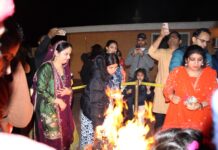
BOSTON: Association for India’s Development (AID) Boston and MIT chapters arranged an enlightening talk by Obalesh Bheemappa on a sensitive topic tilted, ‘Toward Eradicating Manual Scavenging’ on June 1, at MIT campus. The event was attended by MIT scholars, students and AID’s members, among others, from the greater Boston area.
Nimish Sane, the president of AID, Boston chapter welcomed the audience to the event along with his brief introduction of the speakers of the evening. He invited Prof. Neeta Sane, Sociology professor from Dnyanasadhana College (University of Mumbai) at Thane, Maharashtra to give a brief introduction of the topic to audience. Her research is on sanitation workers and manual scavenging community in Maharashtra.
She said that manual scavenging is the cleaning of human waste by communities considered low-caste, which is still practiced in India. It is estimated that around 1.3 million people in India are making their living through manual scavenging. She explained the difference between Manual Scavenger and Safai Karmachari. Manual Scavenger is used to describe the job of removing human excrement from dry toilets and sewers using basic tools such as thin boards, buckets and baskets, lined with sacking, carried on the head whereas Safai Karmachari denotes street sweepers.
This scavenger community is called by different names such as Bhangis, Mehtars, Madigas Daasu, Halalkh or Lalbegi Valmiki and others. This practice of manual scavenging underlines the social stigma that these castes are untouchable and perpetuates discrimination and social segregation. She stressed that their living conditions are still pathetic as the government has not implemented existing legislations aimed to assist manual scavenging community members find alternative, sustainable livelihoods.
Obalesh Bheemappa, who was the main speaker of the evening, hails from the Madiga community, which is the most marginalized even among the Dalit communities. The Madigas form about 95% of the sweepers and manual scavengers in Karnataka. He narrated the pathetic life of manual scavengers in Karnataka and showed many photographs that depicted their horrible working conditions, accidents and deaths while working in the manholes. Devadasi system is widely prevalent in this community and many young uneducated girls from this community are pushed into red-light areas.
Obalesh has been working with his team to eradicate manual scavenging through their organization -Thamate’s interventions in Tumkur district. He explained their three-fold approach: for youngsters they try to provide avenues and encouragement to stay away from this hereditary profession and take up alternative employment; for those who have been working as manual scavengers since decades, they fight for their rights such as minimum wages, provident funds, health insurance, safety equipment etc; and for their kids.
The Thamate is trying to provide them sufficient educational support in the form of after-school tuition classes to ensure their academic progress. Thamate is also a part of the Safai Karmachari Kavalu Samithi (Sanitation Workers Watchdog Committee) in Karnataka, which investigates into atrocities committed on Safai Karmachari workers and fights for justice and compensation in case of injury or death. He emphasized that the main goal of the Thamate and their partners is just fact-finding and making serious legal advocacy efforts.
These two speakers made the audience to think seriously about the harsh realities that still exist in India and support such activists to eradicate such evil practices.
Nitin thanked the speakers for their time and the audience for coming and supporting AID’s efforts.
Geetha Patil






